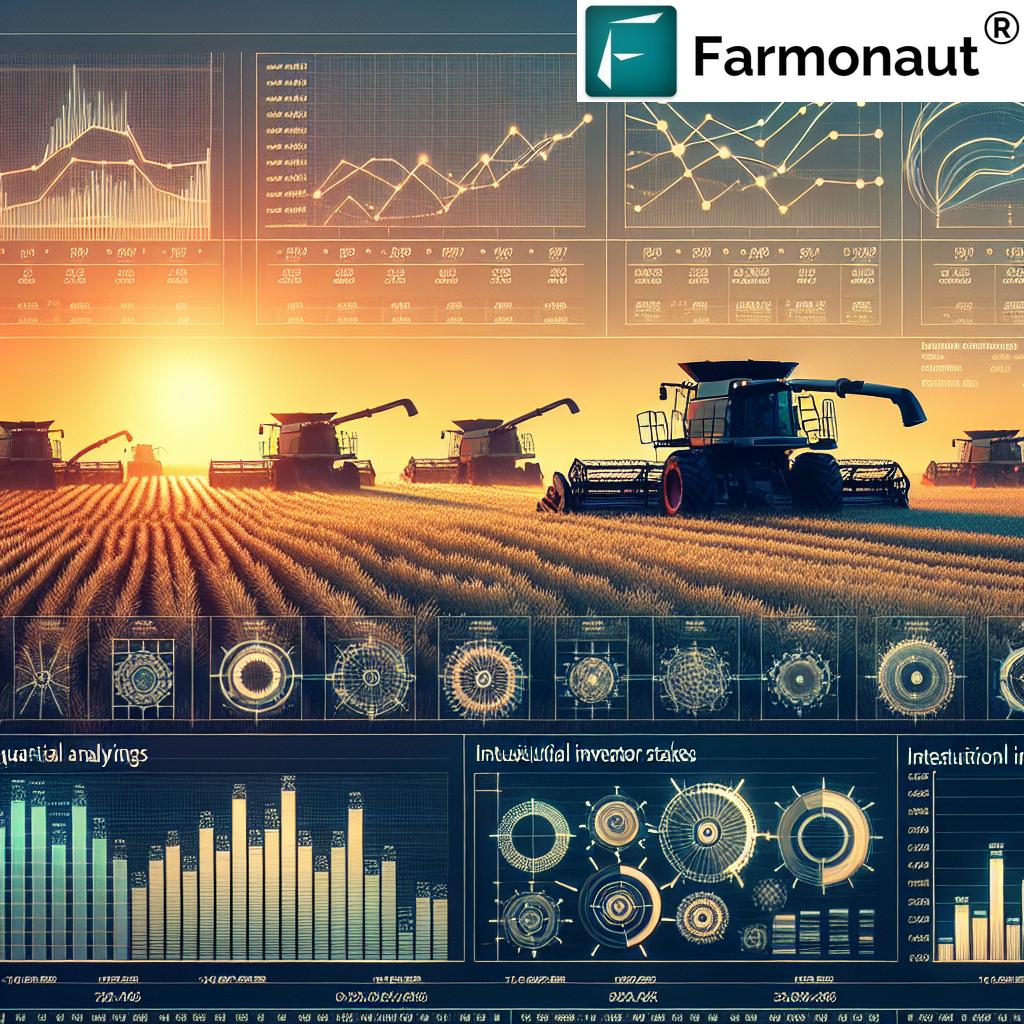Unlocking Profits: Agricultural Equipment Stocks and Institutional Investor Strategies in Q4
In the ever-evolving landscape of industrial products and agricultural equipment stocks, understanding the latest trends and investor strategies is crucial for maximizing profits. As we delve into the fourth quarter performance of leading companies in the tractor manufacturing industry, we’ll explore how institutional investors and hedge funds are reshaping their portfolios to capitalize on emerging opportunities.

“Institutional investors’ holdings in agricultural equipment stocks can significantly impact a company’s market position in just one quarter.”
The Rise of AGCO: A Stock Performance Analysis
Our focus today is on AGCO Co. (NYSE:AGCO), a prominent player in the agricultural equipment sector. Recent filings with the Securities and Exchange Commission have revealed intriguing developments in institutional ownership, particularly highlighting the moves made by US Bancorp DE.
In a notable fourth-quarter maneuver, US Bancorp DE increased its stake in AGCO by an impressive 14.5%. This strategic move resulted in the financial institution holding 1,858 shares of the industrial products company, valued at approximately $174,000. Such a significant increase in holdings speaks volumes about the confidence institutional investors are placing in AGCO’s future performance.
Hedge Fund Portfolio Changes: A Closer Look
The agricultural equipment stocks landscape is witnessing a flurry of activity among hedge funds. Let’s examine some of the key players making moves in this sector:
- Allworth Financial LP: This firm made a bold move by increasing its AGCO holdings by 333.3% in the fourth quarter. They now own 286 shares, valued at approximately $30,000.
- Brooklyn Investment Group: In the third quarter, this group acquired a new stake in AGCO, demonstrating growing interest in the agricultural sector.
- UMB Bank n.a.: They’ve shown significant confidence in AGCO by increasing their holdings by 84.2% in the fourth quarter, now owning 337 shares worth $32,000.
- Venturi Wealth Management LLC: This firm made a substantial move, increasing its stake by 132.9% in the third quarter, now holding 368 shares valued at $36,000.
- LRI Investments LLC: They’ve also joined the trend, boosting their AGCO holdings by 50% in the third quarter, now owning 510 shares worth $47,000.
These movements by institutional investors and hedge funds underscore the growing interest in agricultural equipment stocks, particularly AGCO. It’s worth noting that approximately 78.80% of AGCO’s stock is currently owned by institutional investors and hedge funds, indicating strong confidence in the company’s prospects.
Quarterly Financial Results: Decoding AGCO’s Performance
To truly understand the appeal of AGCO to institutional investors, we need to examine the company’s recent financial performance. In their latest earnings report, AGCO posted earnings per share (EPS) of $1.97 for the quarter. While this fell slightly short of analysts’ expectations of $2.01, it’s essential to consider this figure in the broader context of the company’s overall financial health.
Key financial metrics for AGCO include:
- Quick Ratio: 0.63
- Current Ratio: 1.34
- Debt-to-Equity Ratio: 0.60
These figures suggest that while AGCO maintains a relatively healthy balance sheet, there’s room for improvement in its liquidity position. The company’s ability to meet short-term obligations (as indicated by the quick and current ratios) is adequate but could be strengthened.
Dividend Yield Comparison: AGCO in the Industrial Products Landscape
For investors seeking income alongside growth, AGCO’s dividend policy is an important consideration. The company currently offers a quarterly dividend of $0.29 per share. This translates to an annual dividend of $1.16, representing a yield of 1.23% based on the current stock price.
When compared to its peers in the industrial products sector, AGCO’s dividend yield is competitive but not industry-leading. However, it’s important to note that dividend yield should be considered alongside other factors such as growth potential and financial stability.
Analyst Ratings and Moving Averages: Predicting Future Performance
“Analyst ratings and moving averages are crucial metrics for predicting future performance of tractor manufacturing stocks.”
The investment community’s sentiment towards AGCO is reflected in recent analyst ratings. Here’s a breakdown of the current analyst consensus:
- Hold: 10 analysts
- Buy: 3 analysts
- Consensus Price Target: $104.30
This mixed outlook suggests that while some analysts see potential upside, others are adopting a more cautious stance. The consensus price target of $104.30 indicates a potential upside of approximately 10.8% from the current trading price.
Moving averages are another crucial tool for technical analysis of stocks. For AGCO, key moving averages to watch include:
- 50-day Moving Average: Currently at $98.45
- 200-day Moving Average: Stands at $96.53
The stock’s current price of $94.10 is trading below both these key moving averages, which could be seen as a bearish signal by some technical analysts. However, it’s essential to consider these technical indicators alongside fundamental analysis for a comprehensive view.
Global Agricultural Trends: Impact on Stock Valuations
The performance of agricultural equipment stocks like AGCO is intrinsically linked to global agricultural trends and farm economics. Several factors are currently shaping the industry:
- Precision Agriculture: The growing adoption of technology in farming is driving demand for advanced equipment. Companies like Farmonaut are at the forefront of this trend, offering satellite-based farm management solutions that complement traditional equipment.
- Sustainable Farming Practices: Increasing focus on sustainability is influencing equipment design and functionality, potentially benefiting companies that prioritize eco-friendly innovations.
- Global Food Demand: Rising population and changing dietary habits in developing countries are expected to drive long-term demand for agricultural products and, by extension, farming equipment.
- Trade Policies: International trade agreements and tariffs can significantly impact the agricultural sector, affecting equipment manufacturers’ sales and profitability.
These trends underscore the importance of staying informed about both industry-specific developments and broader economic factors when evaluating agricultural equipment stocks.

Investment Strategies for Industrial Stocks: Lessons from AGCO
The case of AGCO offers valuable insights for investors considering positions in industrial stocks, particularly in the agricultural equipment sector. Here are some key strategies to consider:
- Monitor Institutional Activity: As we’ve seen with AGCO, significant changes in institutional ownership can signal confidence in a stock’s prospects. Keep an eye on SEC filings and institutional ownership trends.
- Balance Sheet Analysis: Pay close attention to financial health indicators such as debt-to-equity ratios, current ratios, and quick ratios. These metrics can provide insights into a company’s stability and ability to weather economic downturns.
- Dividend Considerations: For income-focused investors, evaluate not just the current dividend yield but also the company’s history of dividend growth and payout ratio.
- Technical Analysis: While not a standalone strategy, technical indicators like moving averages can complement fundamental analysis in timing entry and exit points.
- Industry Trends: Stay informed about broader agricultural trends and technological advancements in the sector. Companies that are well-positioned to capitalize on trends like precision agriculture may offer better long-term prospects.
Comparative Analysis of Agricultural Equipment Stocks
To provide a broader perspective on the agricultural equipment sector, let’s examine how AGCO stacks up against some of its key competitors:
| Company Name | Stock Symbol | Current Stock Price | 52-Week Price Range | Market Capitalization | P/E Ratio | Dividend Yield | Institutional Ownership | Analyst Ratings | Recent Quarterly Revenue Growth |
|---|---|---|---|---|---|---|---|---|---|
| AGCO Corporation | NYSE:AGCO | $94.10 | $84.35 – $125.76 | $7.02B | -16.54 | 1.23% | 78.80% | 10 Hold, 3 Buy | Data not available |
| Deere & Company | NYSE:DE | $394.42 | $345.55 – $450.00 | $115.23B | 11.41 | 1.37% | 68.22% | 12 Buy, 8 Hold | 5.4% |
| Caterpillar Inc. | NYSE:CAT | $363.84 | $204.04 – $382.32 | $183.53B | 18.07 | 1.76% | 70.47% | 11 Buy, 9 Hold | 12.3% |
| CNH Industrial N.V. | NYSE:CNHI | $11.85 | $9.77 – $17.98 | $15.74B | 6.81 | 3.39% | 49.87% | 7 Buy, 6 Hold | -1.4% |
This comparative analysis reveals several interesting points:
- AGCO’s market capitalization is significantly smaller than industry giants like Deere & Company and Caterpillar, potentially offering more room for growth.
- The negative P/E ratio for AGCO is noteworthy and warrants further investigation into the company’s earnings situation.
- AGCO’s dividend yield is competitive but lower than some peers, which might be a consideration for income-focused investors.
- Institutional ownership in AGCO is higher than in some of its larger competitors, potentially indicating strong confidence from professional investors.
These comparisons underscore the importance of thorough research and analysis when considering investments in the agricultural equipment sector.
The Role of Technology in Agricultural Equipment Stocks
As we consider the future of agricultural equipment stocks, it’s crucial to recognize the growing influence of technology in this sector. Companies that successfully integrate advanced technologies into their products are likely to gain a competitive edge. This is where innovative firms like Farmonaut come into play.
Farmonaut, while not a manufacturer of agricultural equipment, provides cutting-edge satellite-based farm management solutions that complement traditional farming equipment. Their technology offers several benefits that could indirectly impact the agricultural equipment market:
- Precision Agriculture: Farmonaut’s satellite imagery and AI-driven insights enable more precise use of agricultural equipment, potentially influencing future equipment design and functionality.
- Resource Optimization: By providing real-time data on crop health and soil conditions, Farmonaut’s technology can help farmers optimize their use of equipment and resources, potentially affecting purchasing decisions.
- Market Intelligence: The data gathered through platforms like Farmonaut could provide valuable market intelligence for equipment manufacturers, helping them tailor their products to evolving farmer needs.
For investors in agricultural equipment stocks, understanding these technological trends is crucial. Companies that partner with or integrate advanced agritech solutions may be better positioned for long-term success in an evolving market.
Learn more about Farmonaut’s innovative solutions:
Future Outlook: Agricultural Equipment Stocks in a Changing World
As we look to the future of agricultural equipment stocks, several key factors are likely to shape the industry:
- Technological Integration: The increasing adoption of IoT, AI, and machine learning in agriculture will drive demand for smarter, more connected equipment.
- Sustainability Focus: Growing emphasis on sustainable farming practices will influence equipment design and functionality, potentially benefiting companies that prioritize eco-friendly innovations.
- Global Food Demand: Rising population and changing dietary habits in developing countries are expected to drive long-term demand for agricultural products and, by extension, farming equipment.
- Climate Change Adaptation: Equipment manufacturers that can provide solutions for farming in changing climatic conditions may gain a competitive edge.
- Regulatory Environment: Evolving regulations around emissions and farming practices could impact equipment design and market demand.
For investors, these trends underscore the importance of looking beyond short-term financial metrics when evaluating agricultural equipment stocks. Companies that demonstrate adaptability to these changing market conditions may offer better long-term investment prospects.
Conclusion: Navigating the Agricultural Equipment Stock Landscape
As we’ve explored in this comprehensive analysis, the agricultural equipment stock sector offers both opportunities and challenges for investors. The case of AGCO Corporation provides valuable insights into the dynamics at play in this industry, from institutional investor strategies to the impact of global agricultural trends.
Key takeaways for investors include:
- The importance of monitoring institutional investor activity as a potential indicator of stock performance.
- The need for a balanced approach that considers both financial metrics and broader industry trends.
- The growing influence of technology in shaping the future of agricultural equipment.
- The potential impact of global factors such as sustainability concerns and food demand on the industry’s long-term prospects.
As always, thorough research and a clear understanding of one’s investment goals are crucial when considering positions in agricultural equipment stocks or any sector of the market.
Earn With Farmonaut: Affiliate Program
Earn 20% recurring commission with Farmonaut’s affiliate program by sharing your promo code and helping farmers save 10%. Onboard 10 Elite farmers monthly to earn a minimum of $148,000 annually—start now and grow your income!
Farmonaut Subscriptions
FAQ Section
Q: What are the key factors to consider when investing in agricultural equipment stocks?
A: Key factors include financial health indicators (such as debt-to-equity ratios and profitability metrics), technological innovation capabilities, global agricultural trends, institutional investor activity, and the company’s ability to adapt to changing market conditions.
Q: How do institutional investors impact agricultural equipment stock performance?
A: Institutional investors can significantly influence stock performance through large-scale buying or selling activities. Their involvement often signals confidence in a company’s prospects and can attract other investors.
Q: What role does technology play in the agricultural equipment industry?
A: Technology is increasingly crucial in agricultural equipment, driving innovations in precision farming, IoT integration, and sustainable practices. Companies that successfully incorporate advanced technologies into their products are likely to gain a competitive edge.
Q: How might global food demand trends affect agricultural equipment stocks?
A: Rising global food demand, particularly in developing countries, is expected to drive long-term demand for agricultural products. This, in turn, could boost demand for farming equipment, potentially benefiting well-positioned companies in the sector.
Q: What are some potential risks to consider when investing in agricultural equipment stocks?
A: Risks include economic downturns affecting farmer purchasing power, regulatory changes impacting equipment standards, intense competition in the industry, and the potential for technological disruptions that could render certain equipment obsolete.
For more information on agricultural technology and its impact on farming practices, visit Farmonaut’s API and explore their API Developer Docs.







